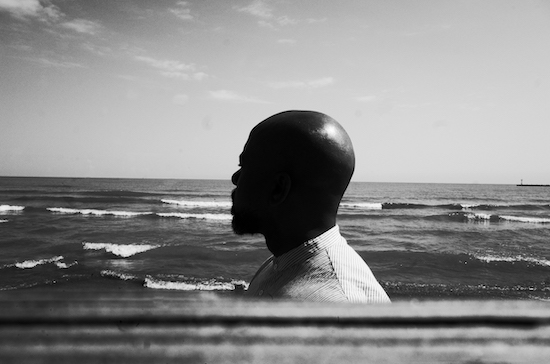Photo by Alejandro Ayala
From the dance of electrons around a nucleus and the first heartbeat heard in a mother’s womb to the cosmic shift of galaxies, you cannot seem to escape rhythm both in time and space. It is everywhere around us, following our each moment and every step, even when it goes unnoticed. It is embedded in the clattering patterns of a passing train, the strained heave-ho of labourers, and the noisy cyclical breathing of a city. On a smaller scale, rhythm is made a central part of Ben LaMar Gay’s Open Arms To Open Us. As the Chicagoan cornetist and composer explains in an accompanying essay, the album deals with rhythm as an “inheritance of information – sort of like DNA or RNA”. Not just a mere collection of patterns or movements, it is an almost metaphysical force here, universal and permanent. “It’s the one trueness that travels great distances,” he writes, “and constantly survives the crumbling of facades.”
In his book of essays Rhythmanalysis, French philosopher Henri Lefebvre conceptualises rhythm as the motor behind the development of spaces and the societies that inhabit them. Similarly, for Gay, rhythm becomes more than a skilled repetition of sonic gestures in music. He makes it into a vessel that carries his art, thoughts, and messages far into the future and deep into the past – akin to an eternal Morse code sequence without beginning or end. And the rhythms that he employs are as eclectic as his career has been, equally likely to draw from hiphop, jazz, bass music, pop, and bossa nova.
Until his 2018 solo breakthrough Downtown Castles Can Never Block The Sun, Gay was primarily visible as a prolific collaborator in Chicago’s creative scene. A member of the Association for the Advancement of Creative Musicians (AACM), he performed with a multitude of adventurous artists like Jaimie Branch, Makaya McCraven, and Joshua Abrams. Meanwhile, his beginnings in South Side Chicago’s graffiti circles surfaced as idiosyncratic takes on hiphop and R&B through collaborations like Bottle Tree with A.M. Frison and Tommaso Moretti.
All of these influences and ideas from across the world – such as those collected during his three-year stay in Brazil in the early 2010s – made Downtown Castles an utterly dazzling experience. Temporally displaced and compiled from material sourced from seven (at the time) unreleased albums, its cuts still revealed a cohesive and fresh vision of what contemporary free music could be. While Open Arms To Open Us retains much of the same openness, it feels significantly different.
Created over a shorter period in the eye of the pandemic storm, it is immediate and purposeful with a soulful core that serves as an anchor for the otherwise stylistically loose musical makeup. “To grasp a rhythm, it is necessary to have been grasped by it; one must let oneself go, give oneself over, abandon oneself to its duration,” writes Lefebvre. To fully understand this record, you have to let yourself be swept up in its rhythms and the myriad of sounds that caress you. And do so, as the title suggests, with open arms.
On the introductory ‘Sometimes I Forget How Summer Looks On You’, made in collaboration with Chicago rock group Ohmme, a syncopated, incessant drum fill haunts an evergreen pop song. A sense of warmth emanates from Gay’s lush croon, before a sliver of funk and a choir of distorted voices push ‘Hood Rich Happy’ into a sort of bittersweet groove. These two opening compositions are almost disorienting at first as their layers of modulating melodies and effects move in strange yet alluring ways.
As an improviser, Gay possesses a keen sense of freedom in music. But like the Art Ensemble of Chicago of old, he understands this freedom not as a license to skronk and overindulge in excessive techniques – when heard, his cornet is subdued – but as a lightweight abandon in using whichever element he sees fit. Case in point, ‘Bang Melodically Bang’ flows along like a fusion of hiphop and jazz, before coalescing into an emphatic chant. ‘Aunt Lola and the Quail’ wobbles through a swarm of elastic sounds chased by a brass texture and frolicking flutes. Meanwhile, ‘I Be Loving Me Some Of You’ assembles a bricolage of Ethio-jazz from synth jitters and wonky beats.
If these tracks blossom from intriguing musical ideas, others seem fascinated by the texture, taste, and sound of language itself. Dorothée Munyaneza sings in Rwanda’s Kinyarwanda language on ‘Nyuzura’. Kinyarwanda’s particular inflection and internal cadence dictate the rhythm, while bass and zither phrases reshape themselves around Munyaneza’s words. Later, Onye Ozuzu and Gay recite the Igbo alphabet and drive ‘Lean Back. Try Igbo’ into a beautiful collapse. Perhaps most striking in its simplicity, Gira Dahnee and Angel Bat Dawid deliver a raw but heartfelt rendition of the standard ‘Sophisticated Lady’ (named ‘S’Phisticated Lady’ here) through bouts of laughter, accompanied solely by handclaps and minimal percussion.
As these songs “for dancing, reflecting, celebrating, bellowing, bawling, stimulation, focus, and deciphering messages from loved ones here and beyond” unfold, their microcosms leave behind bits of a larger narrative. Each motorik beat, inspirited gurgle, echoing vocal polyphony, sampled patter of rain, and discordant noise fits into a puzzle. They carry a message that resounds like a warning and becomes embedded in the flow of time. Although Gay’s message is political and informed by the now, he is far more interested in the future. As if having a bird’s-eye view of history, the album ends with not so much a prediction, but a mantra. A statement of conviction. “We gon win, we gon win,” he repeats against a wind of rumbling drums.


